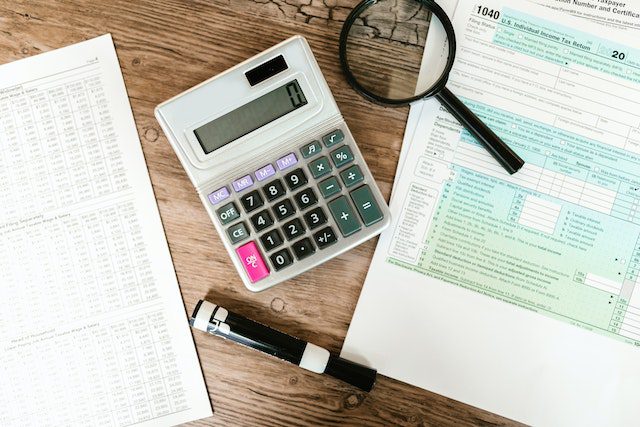How to Complete IRS and Illinois Unfiled Tax Returns
Help! I have not filed required Federal Tax Returns – What Should I Do?
Introduction
With every new year comes new responsibilities, including filing taxes or an extension prior to the April 15th deadline date. Life happens and before you know it, you may have missed the deadline to file your taxes or to file an extension and you have unfiled tax returns.
What happens next?
Tax Terminology: Filing Compliance
Meeting all your tax obligations for years in question. This includes filing of returns and satisfying taxes due by payment or settlement.
Filing Background and Actions
Fast forward a few years and the IRS is sending you notices saying you have unfiled tax returns that need to be filed or else they will commence action. This is not an uncommon scenario for a taxpayer to see and can even occur in situations where a taxpayer has mailed a paper return and the IRS claimed they never received it.
In most cases, the IRS deems a taxpayer in “filing compliance” if they have filed the past 6 years of required returns. For example, a taxpayer would currently be considered in filing compliance if they have filed the 2016-2021 tax returns and were required to file them. Being in compliance is important because it not only keeps the IRS from filing returns on behalf of you (we will discuss more below) but if you owed balances for any years, you would need to be in filing compliance to enter into several types of IRS resolutions. We discuss below the common instances taxpayers may find themselves in when they are missing required unfiled tax returns and how to resolve these issues.
The State of Illinois is significantly harder on compliance than the IRS, so we will deal with those requirements later in this guide.
Filing past Federal returns with little to no documentation
Documentation is very important when accurately preparing tax returns, especially when it comes to Schedule C items and calculations on the 1040 return. Often times, taxpayers may not have the documentation to prepare a 2019 tax return when it is currently 2022. Fortunately, the IRS provides options and resources to obtaining specific documentation to help prepare the missing tax returns.
- Wage & Income Transcript – The IRS has a department you can call to obtain your Wage & Income Transcripts for that year. These transcripts will include any income that was reported to you during that tax year.
- Account Transcripts – The IRS also allows you to contact them to obtain Account Transcripts. This can also be a very helpful resource, especially with self-employment individuals or 1099 individuals who made Estimated Tax Payments during the missing return year.
- Bank Statements – Even if you do not have specific receipts, you may be able to go to your bank and request bank statements for the tax years to help you determine deposits/expenses. This is an extremely helpful resource when you have a Schedule C business and have a business bank account that reflects the expenses/deposits you are trying to claim.
- Contact your Employer – You may also be able to contact your previous/current to obtain income information to help prepare the tax return.
- Contact a Tax Professional – Contacting a tax professional may be a helpful route to take when determining if you have obtained enough documentation to be able to accurately fill out and file the tax return.
After the above documentation has been obtained, you can go to https://www.irs.gov/forms-pubs/prior-year or call 800-TAX-FORM to get the required tax forms and instructions for how to file. According to the IRS, it takes them approximately 6 weeks to process accurately completed past due tax returns.
Help! Can I use estimates to prepare my tax return?
While IRC Section 6001 requires taxpayers to maintain adequate records to support the items listed on their tax returns, when taxpayers do not have complete documentation, they often use estimates when filling out their tax returns. According to the American Institute of Certified Public Accountants, tax prepares are generally allowed to use estimates when preparing tax returns when there is no specific statutory requirement regarding documentation. However, the taxpayer has the responsibility to provide the estimated data. For situations with W-2/1099 income information, it is best to call the IRS to obtain a Wage & Income Transcript in order to avoid potential audit triggers. An issue that comes with using estimations when filling out tax returns is the chance that the IRS may review your tax return and select it for audit.
The IRS has provided discretionary guidance on using estimates to prepare tax returns when little to no documentation exists. This guidance, The Cohen Rule, pertains to certain business expenses and has been used as a defense when the prepared tax return was selected for audit examination and the taxpayer must prove the amount of the claimed deduction. It applies when a taxpayer can show that an expense was incurred but does not have the adequate documentation to reflect the exact amount incurred. The Cohan Rule does have limitations and does not include any items that are listed in Section 274(d) of the Internal Revenue Code, which includes expenses pertaining to business travel, entertainment expenses, and gifts
Therefore, while estimations can be used, a taxpayer needs to be aware of potential audit triggers. That is why it is important that if you use estimations, to base them off as much documentation as you can acquire. For example – if you claim $25,630.00 for tools on a Schedule C. If you do not have any receipts/invoices, it would be beneficial to go through your business bank statements for the year and highlight any transaction where you are certain it was for tools on the statements. Another example would be if you claimed Car & Truck expenses and needed to provide a mileage log – you could look at bank statements to show where your transactions occurred at to help you figure out the work miles you completed for that day.
Don’t let inadequate records cause a failure to file.
Am I required to file Form 1099/Other Information Return?
If you are self-employed or a small business and made a payment during the tax year in question or received a specific payment, you may be required to file an information return. If you also incurred contract labor income and did not receive/lost your 1099, you can also contact the IRS to obtain a Wage & Income Transcript for that year. Account Transcripts can also be obtained and can show any Estimated Tax Payments you made for that year.
If a taxpayer, as part of a trade or business, made any of the types of payments listed below, you will need to file the following information return(s)
- You will need to file Form 1099-NEC for each person you paid at least $600.00 during the tax year if –
- If it was services performed by someone who is not your employee
- Cash payments for fish or other aquatic life from anyone engaged in the trade or business of catching fish
- Payments to attorneys
- Form 1099-NEC is also required for each person from whom you withheld any income tax under the backup withholding rules ($600.00 threshold does not apply here).
- You will need to file Form 1099-MISC for each person to whom you paid during the tax year in the following situations –
- If the payment was for at least $10.00 in lieu of Dividends or Tax-Exempt Interest (Box 8)
- If the payment was for at least $600 in rent (Box 1), Royalties (Box 2), Other Income (including prizes and awards)(Box 3), Federal Income tax withheld (Box 4), Fishing boat proceeds (Box 5), Medical & Health Care Services (Box 6), Crop Insurance Proceeds (Box 9), Gross Proceeds paid to an Attorney (i.e. settlements)(Box 10), Fish purchased for re-sale (Box 11), Section 409A Deferrals (Box 12), Excess Golden Parachute Payments (Box 13), and Nonqualified Deferred Compensation (Box 14).
- You will need to file other miscellaneous 1099 returns in the following situations:
- File Form 1099-INT for interest on a business debt to someone
- File Form 1099-DIV for dividends or distributions to a company shareholder
- File Form 1099-R for any distributions from a retirement of profit or from an IRA or insurance contract
- File Form 1099-K for payments to merchants/entities for payment card or third- party network transactions
If a taxpayer, as part of a trade or business, received any of the types of payments listed below, you will need to file the following information return(s) –
- Form 1098 –Payment of mortgage interest or reimbursements of overpaid interest from individuals
- Form 1099-S – For the sale or exchange of real estate
- Form 1099-B – If you are a broker and sold a covered security belonging to a customer
- Form 1099-MISC – If you made direct sales of at least $5,000.00 of consumer products to a buyer for resale anywhere other than a permanent retail establishment
You are not required to file informational return(s) for the tax year in question if one of the following situations applies –
- You are not engaged in a trade or business
- You are engaged in a trade or business and
- The payment was made to another incorporated business and was not for medical or legal services or
- The sum of the payments made to the person or unincorporated business is less than $600 in one tax year
Help! I’ve been filing late and received an IRS Notice about Filing a Substitute for Return
While there is a risk of being audited from filing tax returns, there is also risk of IRS involvement when taxpayers do not file their required federal tax returns. The IRS may select a year that a taxpayer has not filed a return and file a Substitute for Return (“SFR”) on behalf of the taxpayer. SFRs are based on information that has been reported from your employers, banks, etc. The SFR will have a filing status of either Single or Married Filing Separately which results in the SFR not including any exemptions/credits/deductions. This can create a very large balance for taxpayers and also will include penalties and interest.
When the IRS starts the process of submitting an SFR for that year, they will send out notices, normally first with a CP2566. If a taxpayer receives a CP2566, they will usually be provided time to submit an original return to the contact information listed. If the deadline passes, taxpayer will then receive a CP3219N – Notice of Deficiency that will provide you 90 days to file your past due tax return or petition tax court. If the 90-days passes and no return has been submitted nor tax court has been petitioned, the SFR will be posted on taxpayer’s account. If that occurs, the taxpayer can still submit the original return by submitting it as an SFR Reconsideration.
It is crucial for a taxpayer to start obtaining as much relevant documentation/information as possible to prepare an original return when they receive the SFR notices. It can often be a much longer process to correct when the SFR has been filed and the tax return needs to be submitted as an SFR Reconsideration. It is also very important to submit the requested original tax return to the address it tells you to submit it to on the notices. If you submit it to a different address not listed, it may be lost and will extend the process even longer.
Do you need to hire an experienced attorney to fix your unfiled tax returns for the IRS or Illinois?
If you are facing a challenging tax situation with the State or IRS, it is always a good idea to talk with an attorney who knows the rules. In this case, if you are unable to complete your tax return on your own, or have a complex tax issue you may need to seek professional help.
However, it is not a requirement that you hire an experienced attorney to fix your unfiled tax returns for the IRS or Illinois. You can complete your own tax return by following the instructions on the IRS website or the Illinois Department of Revenue website.

Related Questions
How long can Illinois collect back taxes?
By law, Illinois treats unfiled tax returns very similar to tax fraud. f you commit fraud or fail to file taxes, then the State has unlimited time to collect the past due liability.
Once a liability has been imposed, the State’s time to collect is limited to generally between 2 years to 20 years depending on when the following action(s) occur:
- A lien is filed against your property.
- judgment was entered in the State’s favor.
- Personal penalty assessed if it was a business debt.
- Illinois uses another enforcement actions.
The amount of time they have starts from when the tax liability is deemed assessable,
How long does the IRS have to collect on unfiled taxes?
The Internal Revenue Service (IRS) has a 10-year statute of limitations on collecting unpaid taxes. This means that the IRS can attempt to collect on unpaid taxes for up to 10 years from the date they were assessed. After 10 years, the IRS is no longer allowed to take any action to collect the unpaid taxes.
There are some exceptions to this rule. For example, if you file a fraudulent tax return or don’t file a return at all, the IRS has an unlimited time period to collect any unpaid taxes in theory. In practice, however, we’ve seen the IRS generally limit their collections to the past six years of required tax filings.
If you’re facing a tax debt that you can’t pay, it’s important to understand your options and rights. You may be able to negotiate with the IRS to set up a payment plan or reduce your tax debt.
What happens if I don’t file my taxes illinois?
If you don’t file your taxes in Illinois, you may be subject to a number of penalties. These can include late filing penalties, late payment penalties, and interest on the unpaid tax balance. In addition, the Illinois Department of Revenue may also seize your assets or place a lien on your property. If you’re facing any of these penalties, it’s important to file or contact a tax professional as soon as possible to help you resolve the issue.
How do I fix a tax levy from the State of Illinois?
IDOR may levy your bank account, wages or another asset. To fix a State levy, it is best ot enter an agreement if you cannot pay the back taxes in full. Contacting the state or a tax professional is a must unless you simply want to pay the debt in full via levy. That may sound odd but some people allow this to happen.
Will the IRS work with you on unfiled taxes?
While the IRS does not complete returns on behalf of taxpayers, they generally will give you time to complete returns in a case of failure to file. If proceeding without professional help, you often are best served contacting the IRS and explain your situation. The IRS will then review your case and determine a timeline for completing required filings. If you owe taxes, the IRS may be able to give you a payment plan. If you don’t owe taxes, the IRS generally allows three years to file.
Whether using a tax attorney or not, the sooner you contact them, the better. The longer you wait, the more difficult it may be to get the IRS to help you.
What happens if I file my taxes late?
According to the IRS, about 20% of taxpayers don’t file their taxes by April 15 each year. If you filed an extension, you have until October 15th before triggering any failure to file action.
There are a few things you should know if you’re in this situation and have not filed an extension. First, it’s important to file your taxes as soon as possible. The longer you wait, the more interest and penalties you’ll owe. In fact, if you don’t file your taxes within 60 days of the due date, you could be facing a late filing penalty of up to 25% of your unpaid taxes.
If you can’t pay your taxes in full, don’t panic. The IRS offers a few payment options that can help make things more manageable. You can set up an installment plan, for example, which allows you to spread out your payments over time. There are also a few other options available if you’re unable to pay your taxes in full.
Whatever you do, don’t ignore your tax situation. The sooner you take care of it, the better off you’ll be.
What if I owe an amount I cannot afford to pay?
If you cannot afford the amount you owe, don’t panic. Both Illinois and the IRS have a options available.
If you’re not able to pay your entire tax bill at once, you may be able to set up a payment plan with the State or IRS. There are a few different types of payment plans available, and the best option for you will depend on your individual circumstances. You can find more information on payment plans on the tax authority website or by speaking with a tax attorney or professional.
If you’re struggling to pay your taxes, don’t hesitate to reach out for help. The IRS and Illinois may have a program that can help you get back on track. Call us for a free attorney consultation. (312) 345-5440






